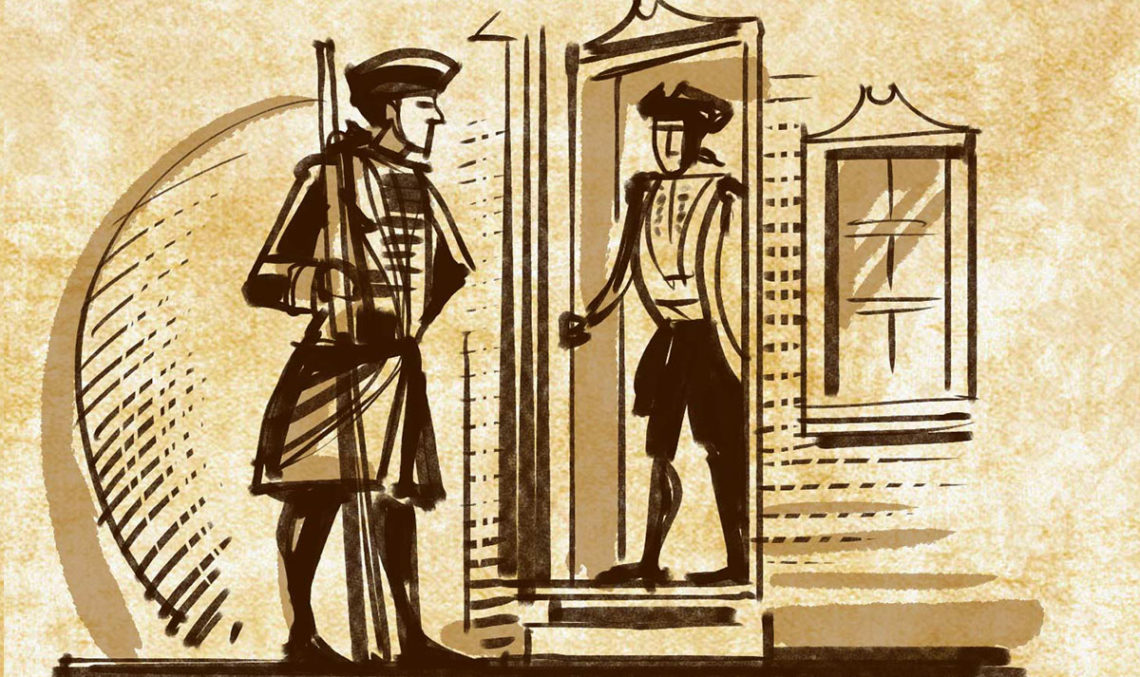A little after midnight on a July morning in 1958, Caroline County Sheriff Garnett Brooks and his deputy invaded the bedroom of Mildred and Richard Loving, demanded they get out of bed and hauled them off to jail.
“They were standing over the bed,” Mildred Loving recalled in an interview in 1987. “They told us to get up and get dressed, that we had to come with them.
“I was crying. I was scared and confused – and angry that they would walk into our home without so much as a knock. The sheriff asked Richard why did he marry me. Richard got kind of smart and asked him why did he marry his wife.”
Brooks put the Lovings in the police car and carted them off to jail, drinking whiskey along the way.
The criminal charge was simple: “Richard Perry Loving being a white man and said Mildred Delores Jeter being a colored person did unlawfully go out of the State of Virginia for the purpose of being married” and were “cohabiting as a man and wife against the peace and dignity of the Commonwealth.”
Virginia was one of 17 states at the time that criminalized inter-racial marriage. Missouri was another.
 Richard Loving’s sister bailed him out after two days, but the sheriff refused to let Richard bail out Mildred, threatening instead to lock him up again.
Richard Loving’s sister bailed him out after two days, but the sheriff refused to let Richard bail out Mildred, threatening instead to lock him up again.
She spent two more frightening days in jail. “I am sure now the sheriff was joking when he asked a black trusty if he wanted to spend the night with me. It scared me so, I hate to think about it.”
The Lovings were found guilty in January, 1959. Judge Leon M. Bazile said, “Almighty God created the races white, black, yellow, malay and red and he placed them on separate continents. And but for the interference with his arrangement there would be no cause for such marriages. The fact that he separated the races shows that he did not intend for the races to mix.”
Bazile levied a one year sentence but said he would suspend it if they got out of the state and stayed out for 25 years.
The Virginia courts later upheld the state law saying that its purpose was to “preserve the racial integrity of its citizens” and prevent “the corruption of blood,” “a mongrel breed of citizens” and “the obliteration of racial pride.”
1987 – a constitutional fulcrum
Mildred Loving told me her story of love, hate, triumph and constitutional change in 1987, 20 years after the Supreme Court threw out Virginia’s law against interracial marriage.
1987 was a fulcrum year in constitutional history. The nation was celebrating the 200th anniversary of the Constitution. The celebration occurred at a moment of deep debate and division about what it should mean.
Is the Constitution a living document growing with the times as the nation’s ideas about liberty, equality and justice grow? That’s what Justice William J. Brennan Jr. had thought. He was the intellectual leader of the Warren Court that had expanded constitutional rights from Brown v. Board in 1954 through Loving.
Or was the meaning of the Constitution frozen at the time the words were written? In 1987 a growing number of originalists believed it was. This included the new Federalist Society, Ronald Reagan’s Attorney General Edwin Meese and the influential new conservative on the U.S. Supreme Court, Justice Antonin Scalia. If justices read their own notions of justice into the Constitution, like Platonic guardians, they are serving as an illegitimate super-legislature, not a court.
The argument came to a head in the fall of 1987 when the Senate rejected the nomination of Robert Bork for the Supreme Court. Bork, a brilliant jurist, had suggested there was no right to privacy because the word privacy doesn’t appear in the Constitution. He testified that Supreme Court decisions on privacy were “improper and intellectually empty.” He added, “nobody knows what that thing (privacy) means.”
Bork’s interpretation suggested the court’s opinions on privacy were illegitimate. That included Griswold v. Connecticut, the 1965 decision recognizing the right of married women to obtain contraceptives and Roe v. Wade, the 1973 decision recognizing a woman’s right to an abortion early in pregnancy.

After the Senate rejected Bork, it confirmed Regan’s nomination of Anthony M. Kennedy.
Over the quarter century since, the presence of Kennedy has made an enormous the difference. Kennedy has breathed new life into the 14th amendment’s protection of “equal liberty” in a series of decisions striking down same-sex sodomy laws, the federal Defense of Marriage Act and finally in establishing the constitutional right to same-sex marriage. He also was a key vote reaffirming Roe v. Wade. Those decisions built on Loving v. Virginia.
Now on the 225th birthday of the Bill of Rights, the vitality of the right of personal liberty and equality is again contested in the political arena, with President-elect Donald Trump considering judges who do not recognize personal privacy.
Lying awake at night
Mildred Loving wasn’t a household name in 1987, much less the central character in a popular film, as she is today. She was a humble woman living far out in the rural Virginia town of Central Point – a community so small it didn’t have a main street, its existence marked by a sign at the intersection of two country highways.
She lived so far out in Virginia that I wasn’t sure I’d be able to find her based on directions from her lawyer. I loaded my 4-year-old son, J, into the car and set off from our home in Bethesda, Md. to see if I could find the woman whose persistence had changed the meaning of privacy and equality in the Constitution.
J is now 33, but he remembers meeting the kind woman who gave him cookies and milk while she told her story from a chair in her kitchen.
Mildred Jetter and Richard Loving grew up in Central Point. Mildred’s brothers knew Richard and introduced them. Because of segregation, Mildred and Richard went to to different schools, Mildred to Union High School 20 miles away in Bowling Green, while Richard went to the local Sparta High School.
When the couple decided to get married, no one in their families objected. But they had to travel to Washington to take the marriage vows because of Virginia’s anti-miscegenation laws. Many of those laws passed in the 1920s when “100 percent Americanism” spread across the country.
In Missouri, the legislature not only banned marriages between whites and blacks but also between whites and Mongolians. Virginia’s Racial Integrity Act of 1924 had a loophole because John Rolfe of the Jamestown settlement had married Pocahontas in 1614. A person with less than one-sixteenth Native American blood could marry a white because he or she might be a descendant of Rolfe’s.
After the Lovings were convicted by Judge Bazile, they moved to Washington for a time and Richard worked as a bricklayer, but they missed their families and hometown and moved back.
Mildred lay awake at night because she was afraid the police would come.
“I had all parts of thoughts at night,” she said. “Is this the night the police will come? What can we do if they come? Maybe if I keep a light on they would think we are not asleep and go away. How did we get into this mess? Is it worth the hassle? Why didn’t we stay in D.C.? God help us please.”
But in the mornings “everything was different. It was so beautiful and peaceful we couldn’t leave.”
A neighbor suggested that Mildred write to Attorney General Robert F. Kennedy. Kennedy sent the letter to the ACLU, which arranged for two civil rights lawyers to take the case. While the case was pending, the KKK burned a cross on the front lawn, but Mildred said that didn’t scare anyone.
Virginia defended its law saying marriage was traditionally a state matter. The court should stick to the original intent of the authors of the 14th Amendment, the post-Civil War amendment. The authors had no notion that equal protection of the law or protecting people’s liberties would include interracial marriages. Congressmen had said during the debate that the amendment would not affect laws against interracial marriages.
It was a choice between a living Constitution and one frozen in meaning at the time it was written.
The Supreme Court threw out the Virginia law on June 12, 1967. The law violated both the equality and liberty promises of the 14th Amendment, the court said.
“The freedom to marry has long been recognized as one of the vital personal rights essential to the orderly pursuit of happiness by free men,” wrote outgoing Chief Justice Earl Warren. “To deny this fundamental freedom on so unsupportable a basis as the racial classifications…so directly subversive to the principle of equality at the heart of the 14th Amendment, is surely to deprive all the State’s citizens of liberty without due process of law.”
Roe v. Wade six years later and Obergefell v. Hodges, 48 years later, cited this same reasoning in support of the personal decisions to have an abortion and to marry a person of the same gender.
‘Guess Who’s Coming to Dinner’
About two weeks before the court announced Loving, filming ended on the Oscar-winning film “Guess Who’s Coming to Dinner.” In the movie, liberals Matt and Joanna Drayton, played by Spencer Tracy and Katharine Hepburn, come to accept their daughter’s decision to marry a brilliant black doctor, John Prentice, played by Sidney Poitier.
It’s more a story out of Hollywood than Central Point. Prentice is a brilliant Nobel Prize doctor so upright that he leaves enough change next to Drayton’s home phone to pay for a long distance call.
Both fathers oppose the marriage at first because of the enormous obstacles racist American society placed in their path. Tillie, the Draytons’ black maid does too, thinking Dr. Prentice is “trying to get above himself.”
Tracy, in his last great monologue as an actor – he died two weeks later – recounts the racist obstacles:
“There’ll be 100 million people right here in this country who will be shocked and offended and appalled and the two of you will just have to ride that out, maybe every day for the rest of your lives. You could try to ignore those people, or you could feel sorry for them and for their prejudice and their bigotry and their blind hatred and stupid fears, but where necessary you’ll just have to cling tight to each other and say ‘screw all those people!’”
The monologue sounded passionate and brave in 1967. Today it sounds like a dated and patronizing expression of liberal guilt, ending with the condescending quip to the maid, “Well, Tillie, when the hell are we donna get some dinner?”
The Central Point story played out differently. The Lovings’ three children grew up in the country, the way they wanted. Two of the children married blacks, one a white.
As Mildred Loving finished telling me her story that fall afternoon in 1987, she sat back in her kitchen chair. “Seems like when I look around, a lot of people through here have mixed marriages now.”
A lot has changed. She was right.
Today the Constitution that said nothing about equality promises everyone equal protection.
The Constitution that says nothing about privacy protects each individual’s personal liberty and dignity to make life choices about marriage and having children.
The Constitution that did not protect people’s freedoms from the oppression of states, now requires all government officials, state and local, to comply with the Bill of Rights.
The Founding Fathers wouldn’t recognize the broad equality, freedom and protection of individual liberty in today’s America. But this modern American Bill of Rights is built on the foundation they laid 225 years ago.


No Comments